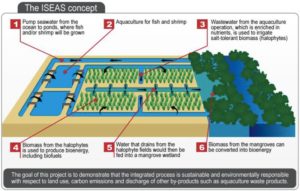by Stefaniya Becking* (Advanced Biofuels USA) If one is looking for an international gathering of leaders in industrial biotechnology to expand their professional network and form new partnerships, the World Congress on Industrial Biotechnology is the place to be. “I have been attending this conference for years because this is a transactional conference, where deals happen,” summarized one of the delegates from Australia. More than 1,300 delegates from 45 countries attended this event that was organized by the Biotechnology Industry Organization and took place on July 19-22, 2015. Speakers covered a wide range of topics related to advanced biofuels, bio-based products and genomics research.
At the conference, researchers, startup entrepreneurs and corporate executives showcased how they continue to realize the ideas that challenge the existing way of producing or procuring goods.
Integrated Seawater Energy and Agriculture System (ISEAS) at Masdar City
 This image (courtesy of the Masdar Institute) summarizes Integrated Seawater Energy and Agriculture System (ISEAS) project.
This image (courtesy of the Masdar Institute) summarizes Integrated Seawater Energy and Agriculture System (ISEAS) project.
Mr. Alejandro Rios Galvan, Director at the Masdar Institute of Science and Technology, highlighted one such research-stage project. The project involves building a pilot facility to produce seafood and oilseed crops (suitable for biofuel production) using seawater in Masdar City in the United Arab Emirates (UAE). The region, characterized by arid climate and abundant seawater, is a perfect ground for testing the feasibility of producing food and fuel locally without using scarce freshwater supplies. “Our concept for bioenergy production could be applied to the UAE and many other arid regions of the world,” stressed Galvan.
The key for integrating aquaculture with agriculture in this project is using halophyte plant species that can thrive in salty waters. Only about 1,600 plant species belong to a group known as halophytes [1] [2]. Saltwater will be pumped into controlled ponds with fish or shrimp, then the ponds’ wastewater effluent rich in nutrients such as nitrogen will be used to irrigate fields with halophytes. Shrimp and/or fish and halophyte biomass would be the outputs of this integrated production scheme. The shrimp and fish would be destined for food markets, while biomass can be converted into bioenergy, including biofuel.
Performance BioFilaments -- Auto Industry Plastic Reinforcement from Wood Cellulose
 This image (courtesy of Performance BioFilaments) illustrates the extraction of cellulose filaments from wood material.
This image (courtesy of Performance BioFilaments) illustrates the extraction of cellulose filaments from wood material.
In addition to research projects, numerous startup companies highlighted their products at the conference. One such company was Performance BioFilaments, a one-year-old spinoff from two large forest products companies, Mercer International Inc. and Resolute Forest Products. Performance BioFilaments aims to commercialize cellulose filaments – a product derived from wood fiber. Cellulose filaments could be used to reinforce plastic. “Plastic reinforced by cellulose filaments is lighter and stronger and could replace fiberglass [also known as glass-fiber reinforced plastic] in vehicles, thus increasing vehicles’ fuel economy thanks to reduced vehicle weight,” commented Mr. Gurminder Minhas, Managing Director at Performance BioFilaments.
The company procures polypropylene (PP) plastic, modifies the plastic by reinforcing it with cellulose filaments, then turns the resulting material into pellets that could be used in the existing infrastructure for making auto parts with injection molding process. Performance BioFilaments is in discussions with automakers such as Ford and hopes to be introduced into their supply chain. “Our next steps are to demonstrate that we can produce material that meets design and performance specifications and to demonstrate recyclability of the material,” said Minhas. He expects it would take 2 to 3 years for their plastic reinforced with cellulose filaments to be fully integrated into automakers’ supply chains.
As the activity in the bio-based products field abounds at the research and startup company level, large corporations continue to take notice and be involved in the emerging bio-based economy. Representatives from Coca-Cola, Exxon Mobil, BP, Boeing, Du Pont and other large corporations attended and/or presented at the conference.
KLM’s Plans on Using Renewable Jet Fuel
 From left to right: Ignaas Caryn (Director of Innovation at KLM), Stefaniya Becking (Advanced Biofuels USA), Luuk A.M. van der Wielen (Professor at Delft University of Technology)
From left to right: Ignaas Caryn (Director of Innovation at KLM), Stefaniya Becking (Advanced Biofuels USA), Luuk A.M. van der Wielen (Professor at Delft University of Technology)
One such large corporation, Air France KLM, the 4th largest airline company in the world based on sales, continues to integrate the use of biofuels in their operations [3]. The company views the biofuel use as the only way to significantly reduce aircraft emissions. “KLM set a goal of achieving 20% reduction in greenhouse gas emissions by 2020 compared to 2011 levels,” highlighted Mr. Ignaas Caryn, Director of Innovation at KLM. Caryn continued: “The more immediate goal is to continuously use aviation fuel with a 1% blend of biofuel, which would translate into using about 30 thousand metric ton/year of biofuel.” Even though this is a tiny dent in the global demand for aviation fuel, given that, according to the U.S. Energy Information Administration (US EIA), 149 million metric tons of jet fuel was consumed in the year 2013 worldwide, this commitment signifies an important trend in the airline industry [4].
For Air France KLM, another driver for being an early adopter of biofuels is managing cost. Caryn reported that Air France KLM spent USD $7.2 billion on aviation fuel in the year 2014, which makes up 30-35% of airline’s operating costs. “Having an array of fuel sources could reduce dependency on one fuel source and the price volatility that comes with it,” said Mr. Caryn.
Caryn also emphasized that the use of biofuels brings a competitive advantage: “A leading role in sustainability offers stronger stakeholder relations." To this end, KLM engaged partners with expertise in sustainability such as SkyNRG’s Sustainability Board and the Roundtable on Sustainable Biomaterials as the company works on meeting its targets. KLM also launched a Corporate Biofuel Program with 16 companies signed up so far. These corporate customers demonstrate a market demand for sustainable aviation fuel and help KLM to offset part of the high biofuel price.
Biochemical Development as Nursery for Biofuel Development
Even though the demand for biofuels is growing, a number of delegates noted a trend in the industry of shifting the focus from producing biofuel to producing bio-based specialty chemicals. Focusing on bio-based specialty chemicals as compared to biofuels allows companies to sell high-value products that stay nearly unaffected by low oil prices. That said, the trend of rethinking the old ways of doing business, shifting mindset and innovating remains strong in the bio-based, renewable products industry.
References
[1] The University of Sussex. “eHALOPH – Halophytes Database.” http://www.sussex.ac.uk/affiliates/halophytes/index.php?content=about. Web. 26 July 2015.
[2] Royal Botanic Gardens. “Salt Tolerance (eHALOPH).” http://data.kew.org/sid/halophyte.html. Web. 26 July 2015.
[3] Forbes. “The World’s Biggest Public Companies. 2015 Rankings.” http://www.forbes.com/global2000/list/#header:revenue_sortreverse:true_industry:Airline. Web. 26 July 2015.
[4] U.S. Energy Information Administration (US EIA). “International Energy Statistics.” http://www.eia.gov/beta/international/data/browser/# . Web. 26 July 2015.
*Stefaniya Becking is a professional with 10+ years of experience in environmental engineering field and information technology applied to creating more sustainable communities. She volunteers for Advanced Biofuels USA by writing articles that cover conference events around the world related to biomass economy. More info is available on her LinkedIn profile: www.linkedin.com/in/stefaniya
Other reports about BIO's World Congress on Industrial Biotechnology 2015 from Biofuels Digest: on Aurora Algae; LanzaTech CEO Jennifer Holmgren; Blume Distillation; DSM, and others
Nearly 55,000 articles in our online library!
Use the categories and tags listed below to access the nearly 50,000 articles indexed on this website.
Advanced Biofuels USA Policy Statements and Handouts!
- For Kids: Carbon Cycle Puzzle Page
- Why Ethanol? Why E85?
- Just A Minute 3-5 Minute Educational Videos
- 30/30 Online Presentations
- “Disappearing” Carbon Tax for Non-Renewable Fuels
- What’s the Difference between Biodiesel and Renewable (Green) Diesel? 2020 revision
- How to De-Fossilize Your Fleet: Suggestions for Fleet Managers Working on Sustainability Programs
- New Engine Technologies Could Produce Similar Mileage for All Ethanol Fuel Mixtures
- Action Plan for a Sustainable Advanced Biofuel Economy
- The Interaction of the Clean Air Act, California’s CAA Waiver, Corporate Average Fuel Economy Standards, Renewable Fuel Standards and California’s Low Carbon Fuel Standard
- Latest Data on Fuel Mileage and GHG Benefits of E30
- What Can I Do?
Donate
DonateARCHIVES
- July 2025
- June 2025
- May 2025
- April 2025
- March 2025
- February 2025
- January 2025
- December 2024
- November 2024
- October 2024
- September 2024
- August 2024
- July 2024
- June 2024
- May 2024
- April 2024
- March 2024
- February 2024
- January 2024
- December 2023
- November 2023
- October 2023
- September 2023
- August 2023
- July 2023
- June 2023
- May 2023
- April 2023
- March 2023
- February 2023
- January 2023
- December 2022
- November 2022
- October 2022
- September 2022
- August 2022
- July 2022
- June 2022
- May 2022
- April 2022
- March 2022
- February 2022
- January 2022
- December 2021
- November 2021
- October 2021
- September 2021
- August 2021
- July 2021
- June 2021
- May 2021
- April 2021
- March 2021
- February 2021
- January 2021
- December 2020
- November 2020
- October 2020
- September 2020
- August 2020
- July 2020
- June 2020
- May 2020
- April 2020
- March 2020
- February 2020
- January 2020
- December 2019
- November 2019
- October 2019
- September 2019
- August 2019
- July 2019
- June 2019
- May 2019
- April 2019
- March 2019
- February 2019
- January 2019
- December 2018
- November 2018
- October 2018
- September 2018
- August 2018
- July 2018
- June 2018
- May 2018
- April 2018
- March 2018
- February 2018
- January 2018
- December 2017
- November 2017
- October 2017
- September 2017
- August 2017
- July 2017
- June 2017
- May 2017
- April 2017
- March 2017
- February 2017
- January 2017
- December 2016
- November 2016
- October 2016
- September 2016
- August 2016
- July 2016
- June 2016
- May 2016
- April 2016
- March 2016
- February 2016
- January 2016
- December 2015
- November 2015
- October 2015
- September 2015
- August 2015
- July 2015
- June 2015
- May 2015
- April 2015
- March 2015
- February 2015
- January 2015
- December 2014
- November 2014
- October 2014
- September 2014
- August 2014
- July 2014
- June 2014
- May 2014
- April 2014
- March 2014
- February 2014
- January 2014
- December 2013
- November 2013
- October 2013
- September 2013
- August 2013
- July 2013
- June 2013
- May 2013
- April 2013
- March 2013
- February 2013
- January 2013
- December 2012
- November 2012
- October 2012
- September 2012
- August 2012
- July 2012
- June 2012
- May 2012
- April 2012
- March 2012
- February 2012
- January 2012
- December 2011
- November 2011
- October 2011
- September 2011
- August 2011
- July 2011
- June 2011
- May 2011
- April 2011
- March 2011
- February 2011
- January 2011
- December 2010
- November 2010
- October 2010
- September 2010
- August 2010
- July 2010
- June 2010
- May 2010
- April 2010
- March 2010
- February 2010
- January 2010
- December 2009
- November 2009
- October 2009
- September 2009
- August 2009
- July 2009
- June 2009
- May 2009
- April 2009
- March 2009
- February 2009
- January 2009
- December 2008
- November 2008
- October 2008
- September 2008
- August 2008
- July 2008
- June 2008
- May 2008
- April 2008
- March 2008
- February 2008
- January 2008
- December 2007
- November 2007
- October 2007
- September 2007
- August 2007
- June 2007
- February 2007
- January 2007
- October 2006
- April 2006
- January 2006
- April 2005
- December 2004
- November 2004
- December 1987
CATEGORIES
- About Us
- Advanced Biofuels Call to Action
- Aviation Fuel/Sustainable Aviation Fuel (SAF)
- BioChemicals/Renewable Chemicals
- BioRefineries/Renewable Fuel Production
- Business News/Analysis
- Cooking Fuel
- Education
- 30/30 Online Presentations
- Competitions, Contests
- Earth Day 2021
- Earth Day 2022
- Earth Day 2023
- Earth Day 2024
- Earth Day 2025
- Executive Training
- Featured Study Programs
- Instagram TikTok Short Videos
- Internships
- Just a Minute
- K-12 Activities
- Mechanics training
- Online Courses
- Podcasts
- Scholarships/Fellowships
- Teacher Resources
- Technical Training
- Technician Training
- University/College Programs
- Events
- Coming Events
- Completed Events
- More Coming Events
- Requests for Speakers, Presentations, Posters
- Requests for Speakers, Presentations, Posters Completed
- Webinars/Online
- Webinars/Online Completed; often available on-demand
- Federal Agency/Executive Branch
- Agency for International Development (USAID)
- Agriculture (USDA)
- Commerce Department
- Commodity Futures Trading Commission
- Congressional Budget Office
- Defense (DOD)
- Air Force
- Army
- DARPA (Defense Advance Research Projects Agency)
- Defense Logistics Agency
- Marines
- Navy
- Education Department
- Energy (DOE)
- Environmental Protection Agency
- Federal Energy Regulatory Commission (FERC)
- Federal Reserve System
- Federal Trade Commission
- Food and Drug Administration
- General Services Administration
- Government Accountability Office (GAO)
- Health and Human Services (HHS)
- Homeland Security
- Housing and Urban Development (HUD)
- Interior Department
- International Trade Commission
- Joint Office of Energy and Transportation
- Justice (DOJ)
- Labor Department
- National Academies of Sciences Engineering Medicine
- National Aeronautics and Space Administration
- National Oceanic and Atmospheric Administration
- National Research Council
- National Science Foundation
- National Transportation Safety Board (NTSB)
- Occupational Safety and Health Administration
- Overseas Private Investment Corporation
- Patent and Trademark Office
- Securities and Exchange Commission
- State Department
- Surface Transportation Board
- Transportation (DOT)
- Federal Aviation Administration
- National Highway Traffic Safety Administration (NHTSA)
- Pipeline and Hazardous Materials Safety Admin (PHMSA)
- Treasury Department
- U.S. Trade Representative (USTR)
- White House
- Federal Legislation
- Federal Litigation
- Federal Regulation
- Feedstocks
- Agriculture/Food Processing Residues nonfield crop
- Alcohol/Ethanol/Isobutanol
- Algae/Other Aquatic Organisms/Seaweed
- Atmosphere
- Carbon Dioxide (CO2)
- Field/Orchard/Plantation Crops/Residues
- Forestry/Wood/Residues/Waste
- hydrogen
- Manure
- Methane/Biogas
- methanol/bio-/renewable methanol
- Not Agriculture
- RFNBO (Renewable Fuels of Non-Biological Origin)
- Seawater
- Sugars
- water
- Funding/Financing/Investing
- grants
- Green Jobs
- Green Racing
- Health Concerns/Benefits
- Heating Oil/Fuel
- History of Advanced Biofuels
- Infrastructure
- Aggregation
- Biofuels Engine Design
- Biorefinery/Fuel Production Infrastructure
- Carbon Capture/Storage/Use
- certification
- Deliver Dispense
- Farming/Growing
- Precursors/Biointermediates
- Preprocessing
- Pretreatment
- Terminals Transport Pipelines
- International
- Abu Dhabi
- Afghanistan
- Africa
- Albania
- Algeria
- Angola
- Antarctica
- Arctic
- Argentina
- Armenia
- Aruba
- Asia
- Asia Pacific
- Australia
- Austria
- Azerbaijan
- Bahamas
- Bahrain
- Bangladesh
- Barbados
- Belarus
- Belgium
- Belize
- Benin
- Bermuda
- Bhutan
- Bolivia
- Bosnia and Herzegovina
- Botswana
- Brazil
- Brunei
- Bulgaria
- Burkina Faso
- Burundi
- Cambodia
- Cameroon
- Canada
- Caribbean
- Central African Republic
- Central America
- Chad
- Chile
- China
- Colombia
- Congo
- Congo, Democratic Republic of
- Costa Rica
- Croatia
- Cuba
- Cyprus
- Czech Republic
- Denmark
- Dominican Republic
- Dubai
- Ecuador
- El Salvador
- Equatorial Guinea
- Eqypt
- Estonia
- Eswatini/Swaziland
- Ethiopia
- European Union (EU)
- Fiji
- Finland
- France
- French Guiana
- Gabon
- Georgia
- Germany
- Ghana
- Global South
- Greece
- Greenland
- Grenada
- Guatemala
- Guinea
- Guyana
- Haiti
- Honduras
- Hong Kong
- Hungary
- Iceland
- India
- Indonesia
- Iran
- Iraq
- Ireland
- Israel
- Italy
- Ivory Coast
- Jamaica
- Japan
- Jersey
- Jordan
- Kazakhstan
- Kenya
- Korea
- Kosovo
- Kuwait
- Laos
- Latin America
- Latvia
- Lebanon
- Liberia
- Lithuania
- Luxembourg
- Macedonia
- Madagascar
- Malawi
- Malaysia
- Maldives
- Mali
- Malta
- Marshall Islands
- Mauritania
- Mauritius
- Mexico
- Middle East
- Moldova
- Monaco
- Mongolia
- Morocco
- Mozambique
- Myanmar/Burma
- Namibia
- Nepal
- Netherlands
- New Guinea
- New Zealand
- Nicaragua
- Niger
- Nigeria
- North Africa
- North America
- North Korea
- Northern Ireland
- Norway
- Oman
- Pakistan
- Panama
- Papua New Guinea
- Paraguay
- Peru
- Philippines
- Poland
- Portugal
- Qatar
- Republic of
- Romania
- Russia
- Rwanda
- Saudi Arabia
- Scotland
- Senegal
- Serbia
- Sierra Leone
- Singapore
- Slovakia
- Slovenia
- Solomon Islands
- South Africa
- South America
- South Korea
- South Sudan
- Southeast Asia
- Spain
- Sri Lanka
- Sudan
- Suriname
- Sweden
- Switzerland
- Taiwan
- Tanzania
- Thailand
- Timor-Leste
- Togo
- Trinidad and Tobago
- Tunisia
- Turkey
- Uganda
- UK (United Kingdom)
- Ukraine
- United Arab Emirates UAE
- Uruguay
- Uzbekistan
- Vatican
- Venezuela
- Vietnam
- Wales
- Zambia
- Zanzibar
- Zimbabwe
- Marine/Boat Bio and Renewable Fuel/MGO/MDO/SMF
- Marketing/Market Forces and Sales
- Opinions
- Organizations
- Original Writing, Opinions Advanced Biofuels USA
- Policy
- Presentations
- Biofuels Digest Conferences
- DOE Conferences
- Bioeconomy 2017
- Bioenergy2015
- Biomass2008
- Biomass2009
- Biomass2010
- Biomass2011
- Biomass2012
- Biomass2013
- Biomass2014
- DOE Project Peer Review
- Other Conferences/Events
- R & D Focus
- Carbon Capture/Storage/Use
- Co-Products
- Feedstock
- Logistics
- Performance
- Process
- Vehicle/Engine/Motor/Aircraft/Boiler
- Yeast
- Railroad/Train/Locomotive Fuel
- Resources
- Books Web Sites etc
- Business
- Definition of Advanced Biofuels
- Find Stuff
- Government Resources
- Scientific Resources
- Technical Resources
- Tools/Decision-Making
- Rocket/Missile Fuel
- Sponsors
- States
- Alabama
- Alaska
- Arizona
- Arkansas
- California
- Colorado
- Connecticut
- Delaware
- Florida
- Georgia
- Hawai'i
- Idaho
- Illinois
- Indiana
- Iowa
- Kansas
- Kentucky
- Louisiana
- Maine
- Maryland
- Massachusetts
- Michigan
- Midwest
- Minnesota
- Mississippi
- Missouri
- Montana
- Native American tribal nation lands
- Nebraska
- Nevada
- New Hampshire
- New Jersey
- New Mexico
- New York
- North Carolina
- North Dakota
- Ohio
- Oklahoma
- Oregon
- Pennsylvania
- Puerto Rico
- Rhode Island
- South Carolina
- South Dakota
- Tennessee
- Texas
- Utah
- Vermont
- Virginia
- Washington
- Washington DC
- West Coast
- West Virginia
- Wisconsin
- Wyoming
- Sustainability
- Uncategorized
- What You Can Do
tags
© 2008-2023 Copyright Advanced BioFuels USA. All Rights reserved.

.jpg)





0 COMMENTS
Leave A Comment
Your Email Address wiil not be Published. Required Field Are marked*